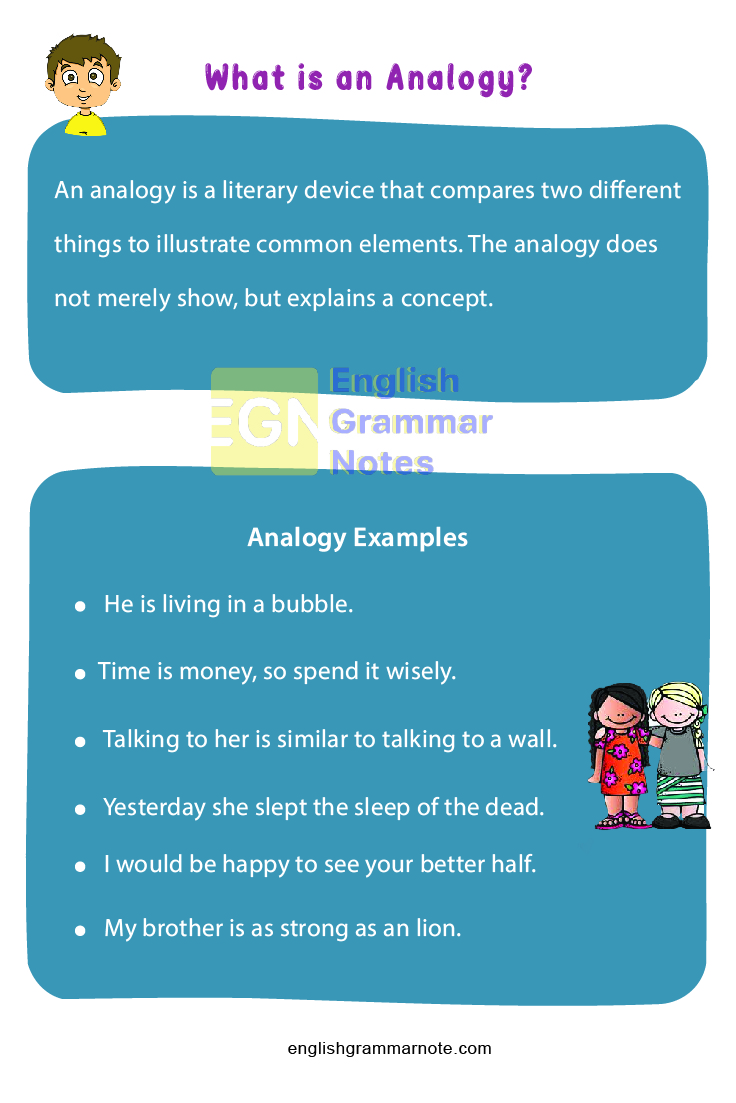The analogy is one of the common literary devices. Even though it’s one of the hardest among figures of speech, the analogy is a very useful literary device. The word ”analogy” has its roots in the ancient Greek analogia meaning ”proportion.” In this article, you will be introduced to all the essential information about analogy including its definition, common examples, its significance, etc.
- What is an Analogy?
- Types of Analogy
- Analogy Examples
- Significance of Analogy
- How to create an Analogy?
- Analogy Vs Metaphor Vs Simile
- Analogy Vs Allusion
- Analogy Synonyms
- What is Analogy?
- Distinguish between analogy and allusion?
- What are the benefits of using analogy?
- Are metaphors and analogies the same?
What is an Analogy?
An analogy is a literary device that compares two different things to illustrate common elements. The analogy does not merely show, but explains a concept. Analogies can be phrased as follows: the first word is to the second word and the third word is to the fourth word.
Types of Analogy
The different types of analogy include
- Literal Analogy: Used to compare two things that are very closely related.
- Figurative Analogy: Used to compare two things that are not quite similar. Comparison is based on specific aspects of unrelated ideas or things.
Analogy Examples
Given below are some of the commonly seen examples of analogy:
- There is a garden on his face.
- They have stars in their eyes.
- He is living in a bubble.
- He was as silent as a mouse.
- Time is money, so spend it wisely.
- His brother is sly like a fox.
- Finding the right person is like finding a needle in a haystack.
- Talking to her is similar to talking to a wall.
- Yesterday she slept the sleep of the dead.
- I would be happy to see your better half.
- My brother is as strong as a lion.
- He is as busy as a bee these days.
- She is as light as a feather.
- Socks are like the gloves of the feet.
- She found it under the sand.
- He was quick like a bunny.

Significance of Analogy
The use of analogies has various benefits. These include:
- Analogies help to explain complex concepts in an easy way.
- Paints a picture in the reader’s mind
- An analogy helps to emphasize concepts and ideas.
- Abstract ideas are made more concrete
- The analogy also adds feeling and emotions to an image
Learn more about the English Language with our website-provided English Grammar Notes and get a great companion to grammar rules and example sentences.
How to create an Analogy?
To write an appropriate analogy, make sure you follow these steps.
- Create easy-to-understand imagery.
- Compare and contrast.
- The most useful analogies explain and inspire
Analogy Vs Metaphor Vs Simile
Simile, Analogy, and Metaphor are closely related terms. However, they are different. Even though all these devices make comparisons, an analogy can be considered a logical argument rather than a simple figure of speech. While Simile and Metaphor only compare various things, analogies provide an explanation for the comparison made.
Analogy Vs Allusion
An analogy is often confused with another figure of speech called allusion. An allusion is a literary device that refers to something that is considered common knowledge. On the other hand, Analogy compares different things and provides an explanation for the same.
Analogy Synonyms
Like other literary devices, Analogy has synonyms like likeness, similitude, similarity, resemblance, etc.
Read More:
FAQs on Analogy
An analogy compares two different things to illustrate common elements. The analogy does not merely show, but explains a concept.
2. Distinguish between analogy and allusion?
An allusion is a literary device that refers to something that is considered common knowledge. On the other hand, Analogy compares different things and provides an explanation for the same.
3. What are the benefits of using analogy?
The use of analogy has several benefits: Analogy adds emotions to what you write, emphasizes an idea or concept, paints a picture in the readers’ mind, helps to explain complex ideas in an easy manner, etc.
4. Are metaphors and analogies the same?
No, Metaphors make comparisons just like analogies. However, an analogy is different from a metaphor as it provides an explanation for the comparison made.
Conclusion
Analogies are useful literary devices as they create an image in the reader’s mind. Analogies give a deeper meaning to words and phrases. An analogy is used to compare two objects and intends to easily explain an idea. The use of the appropriate type of analogy makes sure that readers grasp an idea properly.